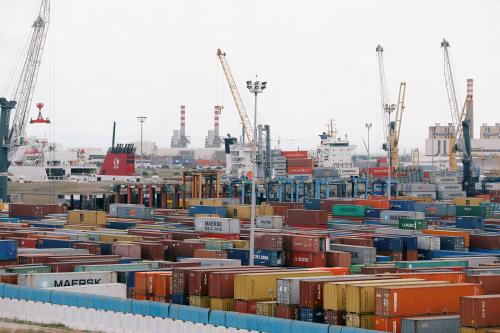African Continental Free Trade Agreement meets ratification threshold for approval
On Tuesday, April 2, the Gambia became the latest African nation to ratify the African Continental Free Trade Agreement (AfCFTA), meeting the minimum threshold—22 out of the 55 member states—for the trade agreement to go into effect. The agreement had been signed by 49 heads of state in March 2018, with Nigeria—the region’s largest economy—being a notable exception. Having reached the threshold, the agreement will go into effect 30 days after the ratifications are filed with the African Union Chairperson’s office.
Leaders have high hopes for the AfCFTA: The United Nations Economic Commission for Africa posits that intra-African trade could grow by 52.3 percent annually once implemented. The free trade area will be one of the largest in the world with over 1.2 billion people and $4 trillion in consumer and business spending. Its creation of a single market and customs union along with free movement for goods and services is expected to boost economies across the continent.
Algeria’s president resigns after weeks of public protests
On Tuesday, Algeria’s president, Abdelaziz Bouteflika, resigned from his position after weeks of largely peaceful public protest that had started in late February. On Monday, he had said that he would resign when his current term ended on April 28, reversing plans to run for a fifth term. However, on Tuesday, the chief of staff of Algeria’s army, Ahmed Gaed Salah, asked the constitutional council to declare the president unfit for office “immediately.” Bouteflika had been president of Algeria since 1999 but has largely been absent from public view since suffering a stroke in 2013.
A caretaker government was appointed on Sunday by President Bouteflika before he resigned and is led by Prime Minister Noureddine Bedoui. The caretaker government will lead the country for the next three months until elections are held. However, protests continued this Friday demanding radical change to the country’s political structure. Further, political turmoil in the country has continued as Algeria’s spy chief was fired on Friday and several businessmen close to Bouteflika have had their passports seized in recent days, preventing them from traveling abroad.
Vodacom executives face criminal charges in Tanzania
On Wednesday, Tanzanian officials charged a group of employees of Vodacom Tanzania—a subsidiary of the South African mobile communications company Vodacom—with withholding 11 billion Tanzanian shillings ($4.8 million) in revenue from the government. The employees, which include the Managing Director Hisham Hendi, are facing 10 criminal counts, including “criminal racket” that caused government revenue losses and for allowing third parties unauthorized use of network services, according to documents filed to a court in Dar es Salaam. The documents say that Hendi and other executives “intentionally and willfully organized a criminal racket, which caused the government … to suffer a pecuniary loss.”
By the number of mobile subscribers, Vodacom is Tanzania’s leading telecom company with about 32 percent of the country’s 40 million mobile subscribers, ahead of Tigo Tanzania, a subsidiary of Sweden’s Millicom, and a local unit of India’s Bharti Airtel. Two years prior, the company went public on the local Tanzanian stock exchange, a move that followed pressure from the government to increase domestic ownership. Hendi was officially named head of Vodacom Tanzania in March this year after months of leading the company in an acting capacity.
In a statement, Vodacom said it “reiterates that it will continue to cooperate with the investigation.”







Commentary
Africa in the news: African Continental Free Trade Agreement updates, Algeria’s president resigns, and Vodacom Tanzania executives face criminal charges
April 6, 2019